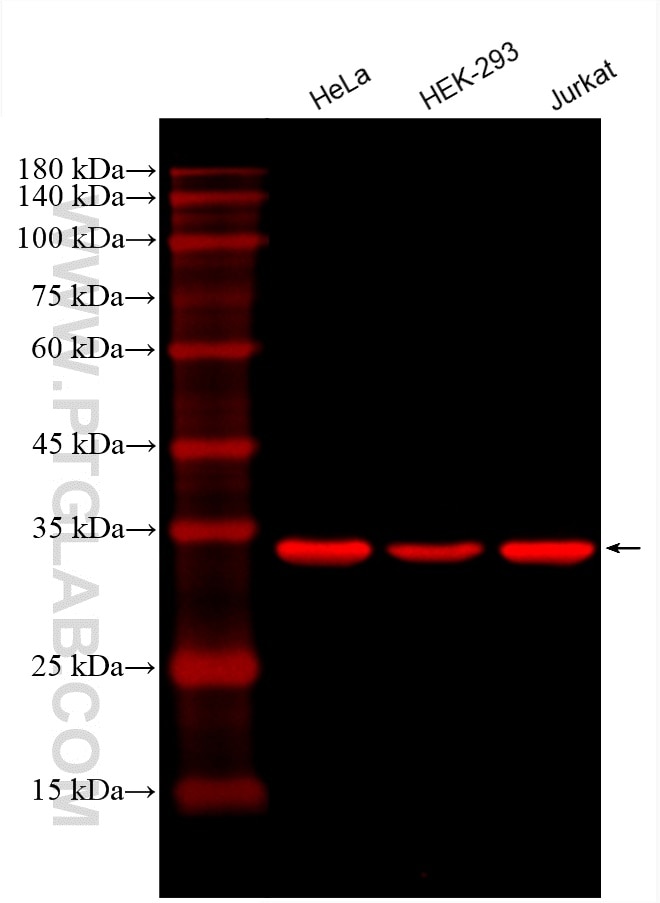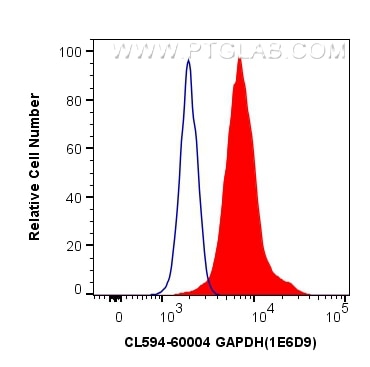Tested Applications
| Positive WB detected in | HeLa cells, HEK-293 cells, Jurkat cells |
| Positive FC (Intra) detected in | HeLa cells |
Recommended dilution
| Application | Dilution |
|---|---|
| Western Blot (WB) | WB : 1:5000-1:50000 |
| Flow Cytometry (FC) (INTRA) | FC (INTRA) : 0.40 ug per 10^6 cells in a 100 µl suspension |
| It is recommended that this reagent should be titrated in each testing system to obtain optimal results. | |
| Sample-dependent, Check data in validation data gallery. | |
Published Applications
| WB | See 9 publications below |
| IF | See 1 publications below |
Product Information
CL594-60004 targets GAPDH in WB, IF, FC (Intra) applications and shows reactivity with human, mouse, rat, zebrafish, yeast samples.
| Tested Reactivity | human, mouse, rat, zebrafish, yeast |
| Cited Reactivity | human, mouse, rat |
| Host / Isotype | Mouse / IgG2b |
| Class | Monoclonal |
| Type | Antibody |
| Immunogen |
CatNo: Ag0766 Product name: Recombinant human GAPDH protein Source: e coli.-derived, PGEX-4T Tag: GST Domain: 1-335 aa of BC004109 Sequence: MGKVKVGVNGFGRIGRLVTRAAFNSGKVDIVAINDPFIDLNYMVYMFQYDSTHGKFHGTVKAENGKLVINGNPITIFQERDPSKIKWGDAGAEYVVESTGVFTTMEKAGAHLQGGAKRVIISAPSADAPMFVMGVNHEKYDNSLKIISNASCTTNCLAPLAKVIHDNFGIVEGLMTTVHAITATQKTVDGPSGKLWRDGRGALQNIIPASTGAAKAVGKVIPELNGKLTGMAFRVPTANVSVVDLTCRLEKPAKYDDIKKVVKQASEGPLKGILGYTEHQVVSSDFNSDTHSSTFDAGAGIALNDHFVKLISWYDNEFGYSNRVVDLMAHMASKE Predict reactive species |
| Full Name | glyceraldehyde-3-phosphate dehydrogenase |
| Calculated Molecular Weight | 36 kDa |
| Observed Molecular Weight | 36 kDa |
| GenBank Accession Number | BC004109 |
| Gene Symbol | GAPDH |
| Gene ID (NCBI) | 2597 |
| RRID | AB_2919886 |
| Conjugate | CoraLite®594 Fluorescent Dye |
| Excitation/Emission Maxima Wavelengths | 588 nm / 604 nm |
| Form | Liquid |
| Purification Method | Protein A purification |
| UNIPROT ID | P04406 |
| Storage Buffer | PBS with 50% glycerol, 0.05% Proclin300, 0.5% BSA, pH 7.3. |
| Storage Conditions | Store at -20°C. Avoid exposure to light. Stable for one year after shipment. Aliquoting is unnecessary for -20oC storage. |
Background Information
Glyceraldehyde-3-phosphate dehydrogenase (GAPDH) catalyzes the phosphorylation of glyceraldehyde-3-phosphate during glycolysis. GAPDH participates in nuclear events including transcription, binding RNA, RNA transportation, DNA replication, DNA repair and apoptosis. Being stably and constitutively expressed at high levels in most tissues and cells, GAPDH is considered a housekeeping protein. It is widely used as a control for RT-PCR and also loading control in electrophoresis and Western blotting. GAPDH is normally expressed in cellular cytoplasm or membrane, but can occasionally translocate to the nucleus after the addition of post-translational modifications such as S-nitrosylation. This antibody is raised against full length GAPDH of human origin. It can recognize the 36 kDa GAPDH protein in most cells/tissues. In addition, a band below 36 kDa can always be detected as the isoform or spliced product of GAPDH (PMID: 23885286, 23877755, 19368702). Please note that some physiological factors, such as hypoxia and diabetes, increase GAPDH expression in certain cell types.
Protocols
| Product Specific Protocols | |
|---|---|
| FC protocol for CL594 GAPDH antibody CL594-60004 | Download protocol |
| WB protocol for CL594 GAPDH antibody CL594-60004 | Download protocol |
| Standard Protocols | |
|---|---|
| Click here to view our Standard Protocols |
Publications
| Species | Application | Title |
|---|---|---|
Cell Signal A novel role of ADAMTS16 in renal fibrosis through activating TGF-β/Smad signaling | ||
BMC Cancer Oridonin-induced ferroptosis and apoptosis: a dual approach to suppress the growth of osteosarcoma cells | ||
Brain Sci Itaconate Attenuates Neuroinflammation and Exerts Dopamine Neuroprotection in Parkinson's Disease through Inhibiting NLRP3 Inflammasome | ||
Reprod Sci Three Novel Mutations in TUBB8 Cause Female Infertility Due to Multiple Morphological Abnormalities of the Oocyte and Early Embryo | ||
iScience Schwann cells-derived exosomal miR-21 participates in high glucose regulation of neurite outgrowth | ||
MedComm (2020) Targeting the miR-96-5p/Cathepsin B Pathway to Alleviate Neuron-Derived Neuroinflammation in Alzheimer's Disease |






